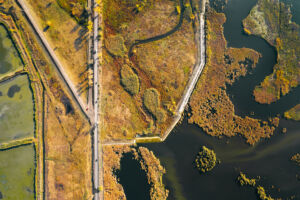
Scientific Hubs and Research Units
Social-Ecological Research
In our scientific hubs, we continuously develop theories and concepts about the relationships between nature and society and their sustainable design. To do this, we combine theoretical and conceptual considerations of Social Ecology with empirical research in our research areas.
Our Scientific Hubs offer the opportunity to further develop theories and concepts. Each of the three Hubs represents its own epistemological approach to Social Ecology with the inherent aim to develop it further. The Hubs each form their own mutually inspiring analytical-conceptual space for structured transdisciplinary research. For ISOE’s scientists, however, the respective epistemic perspectives are more than just programmatic points of reference for research. The perspectives also stand for organizational units. They are thus both places of research and places where the work at ISOE is embedded in organizational and social terms.
-
Social-Ecological Systems
The “Social-Ecological Systems” Hub investigates from a systemic perspective the complex and dynamic relationships between societal actors and natural resources, as well as those between the actors themselves. The concept of social-ecological systems provides the basis therefor.
-
Practices and Infrastructures
The “Practices and Infrastructures” Hub investigates the interplay between practices and infrastructures with regard to shaping social-ecological transformations. Here, we focus on societal actors and their everyday practices, as well as on the socio-technical systems that condition them.
-
Knowledge Processes and Transformations
The “Knowledge Processes and Transformations” Hub examines the diverse interplay between knowledge and social-ecological transformations. Here we ask how knowledge is generated, exchanged, used and strategically mobilized when it comes to the shaping and blocking of transformations.
Areas of empirical research
In our Research Units, we develop new knowledge and practical approaches which show how current challenges can be met in a sustainable and just way and how conflicts can be constructively managed.
To this end, we conduct research in our national and international projects together with our partners from science, civil society, administration and business on topics such as water scarcity, climate change, biodiversity loss and land degradation, environmental risks or mobility. We also further develop the methods and concepts of transdisciplinary research and promote their establishment in the scientific system.




